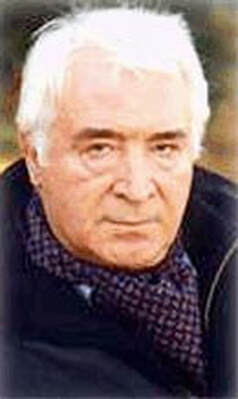 Photo: https://www.babelio.com/livres/Kantchev-Veilleur-de-nuit-de-laurore/199223 I first became acquainted with the poetry of Nikolaï Kantchev in several issues of Visions International. Kantchev (1938 – 2007) was a Bulgarian poet, recognized after the fall of the Communist regime as one of the great Bulgarian poets of the 20th century. His first poems were published in 1957. He was barred from publishing from 1968 to 1980, but then published around thirty collections before his death in 2007. He has been translated into French (the French Wikipedia article is the source of my biographical and publication information) and several other languages, including Spanish, Italian, German, and Polish.
The English translations in Visions International are by Pamela Perry, a folklorist specializing in Bulgaria, and by Bradley Strahan, poet and editor of Visions International. Kantchev sent to Pam his own rough literal translations into English; she cleaned them up and sent them to Brad who, he writes, “to the best of my ability, … tried to make them work poetically in English without losing the intent and nature of the original.” Hopes for publishing a collection didn’t work out, but Visions continues to publish the translations. For Brad, it is a personal as well as literary project. In 2003, when he was in Macedonia on a Fulbright, he met Kantchev in Sofia after a scary bus ride through the mountains. The first of Kantchev’s poems that caught my attention was “Wonders,” in number 92 of Visions International and reprinted here with permission: Wonders Wherever I look wonders tremble in a haze. A sunflower hurls a shining hare into space while my right hand speaks to my left. Facing my doppelganger I reply to my face, Forgetting that the earth's skin bleeds with lava. A treacherous wave sweeps toward us from the sea, while the angry man's head becomes thoughtless fist. There's no golden mean where they rule. Let the one who claims you don't need wings to fly drag himself over the land with a sea-snake's legs. Uncovered during the night, I half close my eyes to see if the cold will melt the Arctic. Later the artificial ice will turn to glass. White crows are perched on a snowy peak. Toward evening they strew their feathers on the milky-say. Even if it's Turkish-blue, the azure can't become a sultan, though the moonlit beach glows with naked women. In this place where the young have old testament faces the plain is still grass and the grass a plain. Here I've become the fourth leaf of a clover. Let darkness spend the day in a well! Let our ears be locked away from evil, so that Cerberus' barking can't be heard. With unheard words love half opens the world. Every echo shall carry the flag of love's voice. According to Wikipedia, Kantchev’s poetic practice employs many forms, combining modern and archaic techniques so as to offer, in the course of his books, a “personal synthesis of the history of poetry, whose epochs all appear as contemporary.” The wide range of cultural, historical, and literary references in “Wonders” supports the accuracy of this generalization. Though perhaps the poet would disagree--"that is not what I meant at all"--his work seems to participate in our long historical moment in literature, where the past, as Eliot wrote, becomes “fragments I have shored against my ruins.”
0 Comments
Leave a Reply. |
AuthorWrite something about yourself. No need to be fancy, just an overview. Archives
July 2024
Categories |
 RSS Feed
RSS Feed